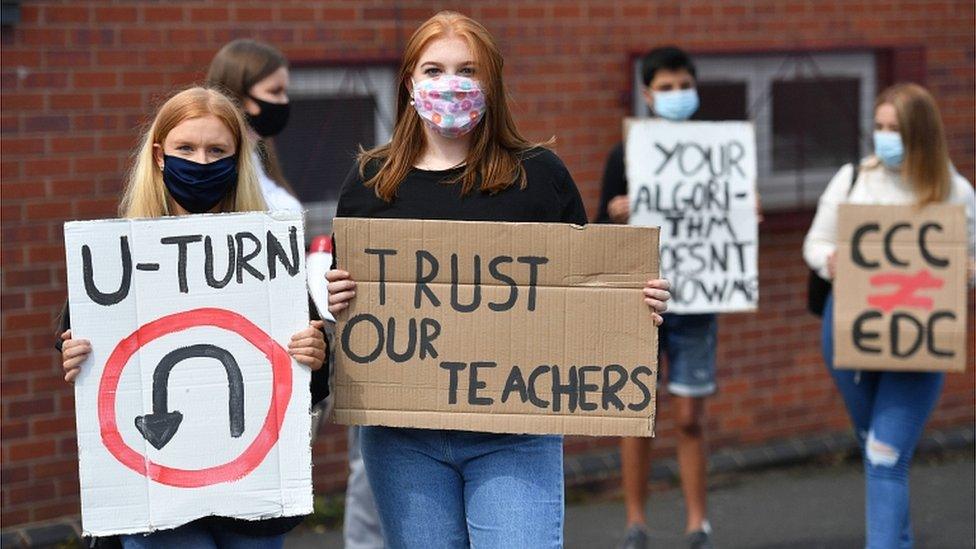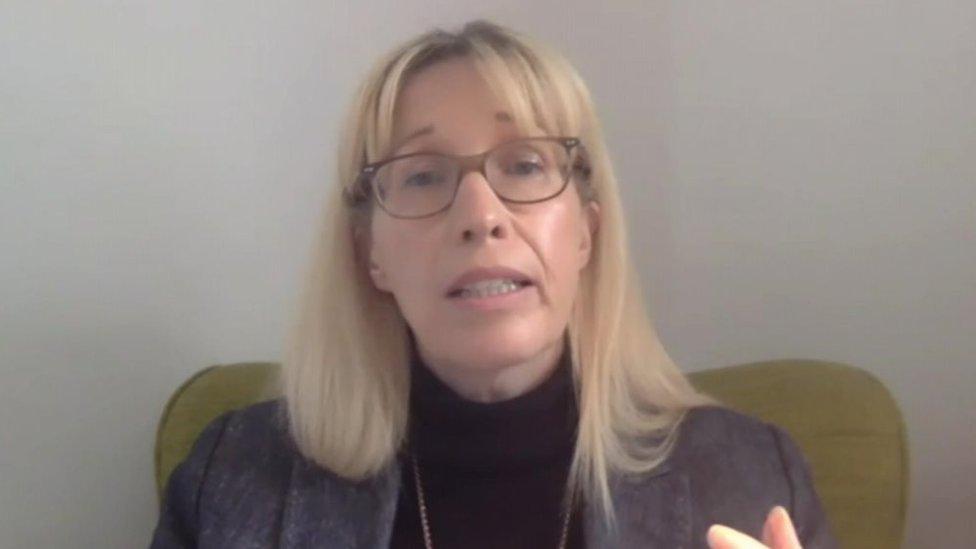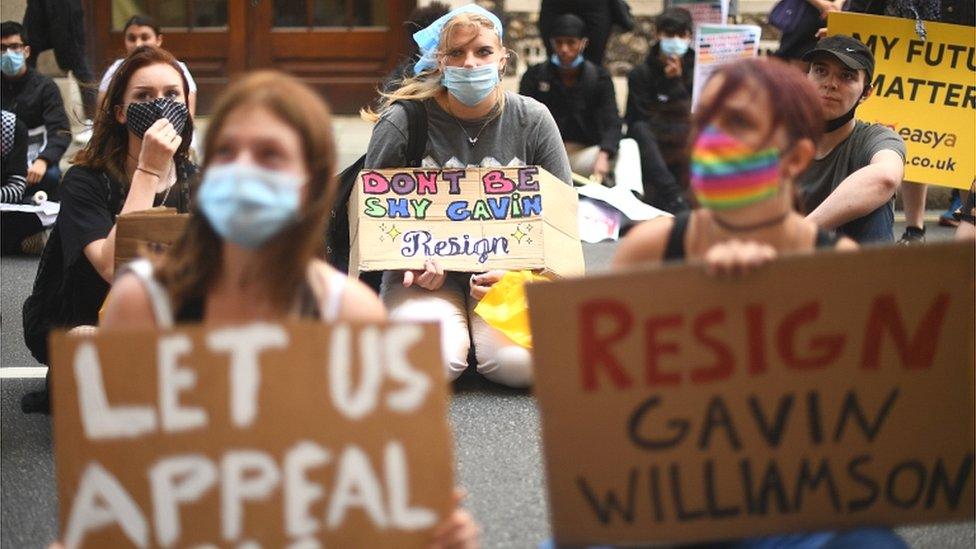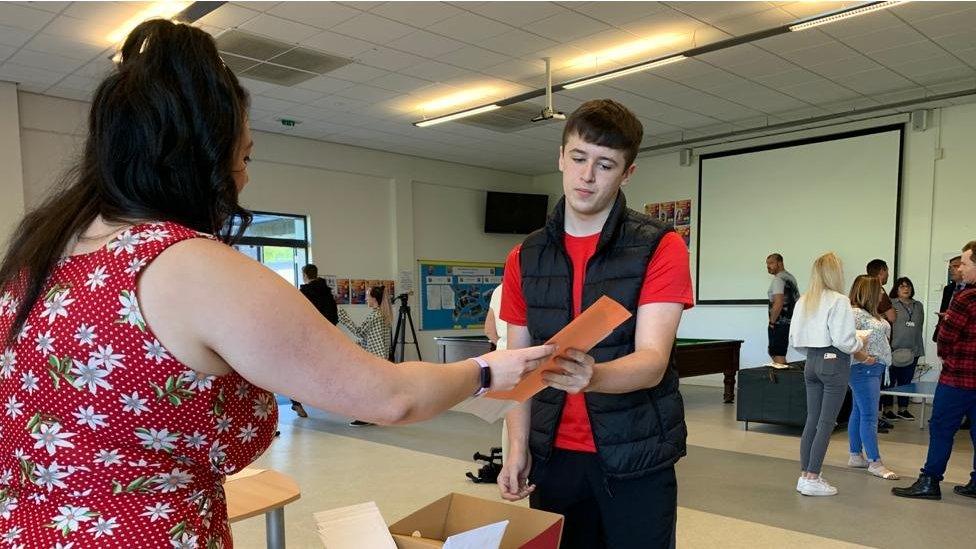Ofqual warned grades system would not win public support
- Published
- comments

England's exams regulator, Ofqual, says it was a "fundamental mistake" to think the public would accept an emergency grading system instead of exam results.
Chairman Roger Taylor said Ofqual advised ministers to hold socially-distanced exams or delay them.
If these two options were unworkable, then calculated grades could be used, he said Ofqual had advised.
Mr Taylor said Education Secretary Gavin Williamson cancelled exams without further reference to Ofqual.
Labour said it was "now clear" that Mr Williamson was responsible for the exams chaos and that he should not blame Ofqual.
But a spokesman for the Department for Education said that the decision to cancel exams had been a "necessary step to fight the spread of coronavirus".
When did problems appear?
Labour leader Sir Keir Starmer used Prime Minister's Questions to challenge Boris Johnson over when he first knew there was a problem with the algorithm for deciding grades.
Mr Johnson defended his government's record, accusing Sir Keir of being "Captain Hindsight".
"We did institute a change, we did act," and students did get their grades, said the prime minister.

Sally Collier resigned over the exams chaos
But Mr Taylor told MPs on the Commons education select committee: "The fundamental mistake was to believe this [system] would ever be acceptable to the public."
Mr Williamson took the decision to cancel exams when schools were closed by the coronavirus and increasing number of teachers were shielding.
Ofqual had to develop a system to award grades for exams which pupils could no longer take.
This produced a moderation process that saw 40% of A-level grades being lower than the grades estimated by their schools.
'Valid mock?'
But Mr Taylor defended Ofqual's approach to calculating grades, saying it was trying to carry out ministerial guidelines.
He argued that the system of standardising grades, the so-called "algorithm", would on the whole have helped disadvantaged pupils.

Students were left uncertain about grades in U-turns over exam results
The Ofqual chairman said that in March the regulator had been consulted by the Department for Education about the implications of cancelling exams.
At this point, Ofqual said there were four options:
to delay exams until the virus crisis passed
conduct socially distanced exams
use some form of teacher and school-assessed certificates
or to combine school-based assessments with the standardisation model to produce estimated grades
Mr Taylor said that he and his officials had repeatedly warned the Department for Education of the risks of using estimated grades.
Julie Swann, Ofqual's executive director for general qualifications, said a paper on May 1 "highlighted the risk of widespread dissatisfaction" from students, schools and colleges.
But after problems and inconsistencies emerged with grades, the moderation process was ditched in a U-turn, and teachers' grades were used instead.
Resignations
The chief regulator, Sally Collier, resigned and the Department for Education's most senior civil servant, Jonathan Slater, stepped down following the exams chaos.
Mr Taylor, also revealed Ofqual guidance on using "valid mock" exam results to widen the appeals process, was removed from the Ofqual website after an intervention from England's education secretary.

Results for this year's exams were caught up in confusion
Mr Williamson had decided to allow mock exam results to be used as evidence in appeals over grades.
Mr Taylor said Mr Williamson telephoned the chief regulator, Sally Collier, late on a Saturday night, August 15, after Ofqual published new appeals guidance, saying it was not consistent with the education secretary's policy.
Ofqual, which is independent from government, had been trying to formulate a way for such appeals to work, while meeting its statutory duty to ensure exams were fair.
Mr Taylor said the board then met in emergency session to try to find a way through a situation which was rapidly "spinning out of control".
"We advised the Secretary of State at this point that we could not be confident that this could be delivered within the statutory duties of Ofqual to ensure that valid and trustworthy grades were being issued."
'Exams U-turn'
Discussions followed throughout Sunday, in which it became clear that a move to "centre assessed grades", which had been submitted by schools and colleges, was all but inevitable.
Mr Williamson went on to announce that results would use these centre assessed grades in a major U-turn.
A Department for Education spokesman said the "government never wanted to cancel exams because they are the best and fairest form of assessment.
"We listened to views from a range of parties, including Ofqual, and given the public health requirements at the time, made what was a very difficult decision on the basis that it was a necessary step to fight the spread of coronavirus."

BACK TO SCHOOL: BBC Bitesize is here to help
AUTUMN TERM: What are this term's topics?
